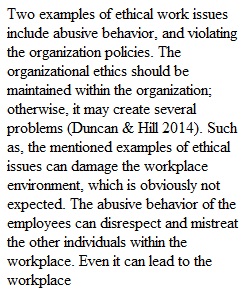


Q 1. Describe two examples of ethical work issues that demonstrate why this is an important matter for employers. 2. Why is it important to manage dismissals properly? 3. What are the four components of the FOSA format of corrective action documentation and what does this format help the employer to accomplish (as described in the handout)? 4. How does the FOSA format compare to how corrective actions are documented at places where you have worked? As a manager, do you think this approach would be helpful? Why or why not? 5. Using the performance management strategies outlined in the handout, as the manager, what would be your next course of action in the following cases. Case Study A Joe, an IT Specialist, has been tardy several times during the past month and today he was a “no show”. He eventually called in but it was after noon. His reason for being late was that he overslept (again). Because of his absence, another employee Tera agreed to stay late but you had to pay Tera overtime. Not only that, but Terra missed an important family function, one she had been talking about for some time. Joe’s attendance has been a problem for some time. You talked with him on two different occasions and found out the reason he was late in the past was because his alarm clock failed to wake him up. You have been keeping records of his attendance and the times you have spoken to him. You have tried coaching him, but Joe’s attendance has not improved. Case Study B Chris, a Customer Service Representative, has a hot temper and quick wit. On several occasions, he has reacted abruptly and rudely to customers both in person and over the phone. On one occasion he was heard arguing with a vendor regarding office supplies. It has been going on over the past several months. First you gave feedback, then when that didn’t work, you began coaching Chris each week on how to be more customer service orientated. After several coaching sessions, you gave Chris a formal warning because he just couldn’t control his temper. During the discussion meeting of this warning, you gave him a copy of the company’s Communication Paradigm and set very clear expectations about his behavior. During this meeting, Chris was very difficult, making jokes and witty comments to confuse the issues. In the warning you gave him, you stated that if he did not improve his performance in the area of customer service, he would face further disciplinary action including termination. Earlier today, as you were passing by Chris’s workstation, you heard him swear and yell to a customer over the phone. You were shocked at how inappropriate the conduct was despite all the coaching you have done with Chris.
View Related Questions